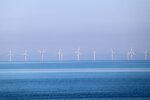News Release from windfair.net
Wind Industry Profile of
More than 140GW of new wind power capacity expected in Europe to 2025 despite deep regulatory reform
Persisting low power prices in Northern Europe and EU state aid regulations are prompting governments to reconsider FITs and to design support mechanisms more sensitive to power price fluctuations in order to avert an escalation in public expenditures. The resulting uncertainty is driving a rush to the market in countries with expiring FITs and in the UK, where the early phase-out of the RO regime left 5 grace periods with a significant pipeline of projects to be completed before the end of the decade. In other markets with support mechanisms already sensitive to power price fluctuations, low power prices have several repercussions. They have deterred several developers from commissioning new assets; driven commissioning of few large wind farms, thanks to cooperation with institutional investors and PPAs with large commercial off-takers; caused a low level of remuneration in Denmark and lowered funds available for new wind plants in Austria. Europe is adjusting to a new normal.
European markets added 14.4GW of wind power capacity in 2015, representing 9% growth over the previous year. Germany, Poland, Turkey, Finland and the Netherlands all set new growth records. Continued growth in 2016 will fall short of the record set in 2015, with 14.2GW expected due to a slowdown in the offshore market. Germany will lead Europe with more than 36GW of new capacity between 2016 and 2025. The UK and Turkey will follow, with 15.7GW and 13.5GW, respectively, across the same period.
Northern Europe will reach annual demand of 8GW in 2020, fueled by policy targets and almost 3GW of new offshore wind capacity. Reduced annual demand levels after 2020 will impact the 10-year average compound annual growth rate (CAGR), which MAKE expects to be -2.5%.
MAKE estimates that Southern Europe will account for 28% of new European wind power capacity in the forecast period, with growth escalating towards the end of the period and a CAGR of 7%. Eastern Europe will account for the remaining 12% of new wind power capacity, with eventual policy stability supporting a CAGR of 3.5% over the outlook.
The offshore market accounted for 21%, or 3GW, of all new grid-connected capacity in Europe in 2015, more than double the amount connected in 2014. 1.2GW are expected to be grid-connected in 2016, with growth averaging 3GW per year from 2017 to 2025 and representing a key driver of growth in Europe.
The 2020 renewable energy targets have thus far acted as a core driver for European growth. However, the short-term outlook in Europe is also influenced by regulatory adjustments across the EU following national implementation of the EU Commission’s Guidelines on State aid for environmental protection and energy 2014-2020.
In the long term, the 2030 targets provide only EU-binding goals without country-specific obligations. This is a barrier to long-term policy certainty that needs to be removed in order to enhance visibility on the post-2020 regulatory framework and facilitate new investments. The EU emissions trading system is critical to drive the transition from fossil fuels to renewable electricity from 2020 to 2030, assisted by LCOE reductions realized through progress in wind energy technology innovation.
MAKE’s Europe Wind Power Outlook 2016 is a 100+ page report containing 100+ charts, tables and graphs providing in-depth analysis of the wind power markets in Europe. The report studies the key drivers and barriers for new wind power installations in Europe with a focus on specific national and subregional markets. The analysis focuses on macro conditions, regulatory frameworks as well as 10-year market outlooks and three forecast scenarios (bull, base and bear) for each Tier I and II market. Market models are illustrated, demonstrating the critical forces that are shaping demand for new wind power generation assets.
- Source:
- Make Consult
- Link:
- www.consultmake.com/...
- Keywords:
- Make, Wind Power Outlook, report


























